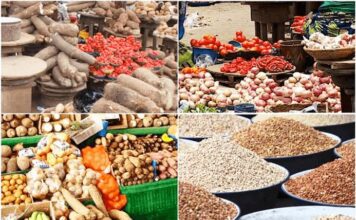The Federal Competition and Consumer Protection Commission has attributed the high prices of food and other goods in the country to the distribution sector, which includes wholesalers and retailers. This information was revealed by Uchegbu Chukwuma, the South-South Zonal Coordinator of FCCPC, during a survey of the Oil Mill Market in Port Harcourt.
Following market inquiries in various states within the zone, the commission found evidence suggesting that players in the distribution sector, such as wholesalers and retailers, may be collaborating in activities like price manipulation, hoarding, and other unfair practices to stifle competition in the market.
These actions result in limited food supply, artificial price inflation, and are deemed as illicit, unprincipled, and exploitative, thus contravening the FCCPA regulations.
Chukwuma explained that the Commission has been engaging with traders’ associations and market participants to investigate the reasons behind the consistent increase in food prices.
The fact-finding mission involves direct interactions with key market stakeholders, including market executives, unions, sellers, and consumers.
The primary focus of FCCPC remains on fostering market transparency, addressing consumer protection concerns, and tackling competition-related issues that impact the pricing of goods in the food industry.
He mentioned, “FCCPC’s surveillance efforts suggest participants in the food chain and distribution sector, including wholesalers and retailers, are allegedly engaged in conspiracy, price gouging, hoarding and other unfair tactics to restrict or distort competition in the market, restrict the supply of food, manipulate and inflate the price of food indiscriminately.
“These obnoxious, unscrupulous, exploitative practices are illegal under the FCCPA.
“Following this exercise, the commission would develop a concise report of its inquiry and make recommendations to the government in line with Section 17(b) of the FCCPA and initiate broad-based policies and review economic activities in Nigeria to identify and address anti-competitive, anti-consumer protection, and restrictive practices to make markets more competitive while also ensuring fair pricing for consumers.
“As part of our mandate as enshrined in FCCPA section 17B, part of what we do is to advise the Federal Government on policies, especially economic policies, so what we are doing today is what we call a market survey to find out what has been causing this continuous price increase of goods and services in the market places.”
Chukwuma noted, “We know that recently the dollar went up and also drove the price of goods and services in the marketplace, but the government in its wisdom has done everything it can to reduce the rate of dollars against naira, but we have not seen a commensurate reduction in the price of goods and services.
“People are saying that whenever prices go up it cannot come down again, but we are asking what drove the cost of goods and services and what is sustaining it, so that is why we have decided to take this exercise with the market leaders, the sellers, and also the buyers.
“So when we collate this information we are gathering we use it to advise the government on policies and what to do because the total essence of government is for welfare and the security of the citizens.
“So I know that this current government is a government that listens if sound arguments and policies are presented. I am sure that they will be willing to buy into it so that our consumers will smile again.’’
“We have found out that there is a lot of money that people pay from point of purchase. Almost all the people we spoke with said the same from Benue State to this place. Each truck coming here pays not less than N250,000 as illegal fees enroute their respective destinations.”
During a recent visit to the Oil Mill Market in Port Harcourt, Wakadaily learnt that, certain vendors at the market voiced their challenges, attributing the surge in prices to increased transportation costs and frequent stops at police checkpoints where officers solicit gratuities along the route.
One of the traders pointed out, “If only petrol prices can come down and these policemen allow us to move freely with our goods, we will sell according to the way we buy the goods.”
